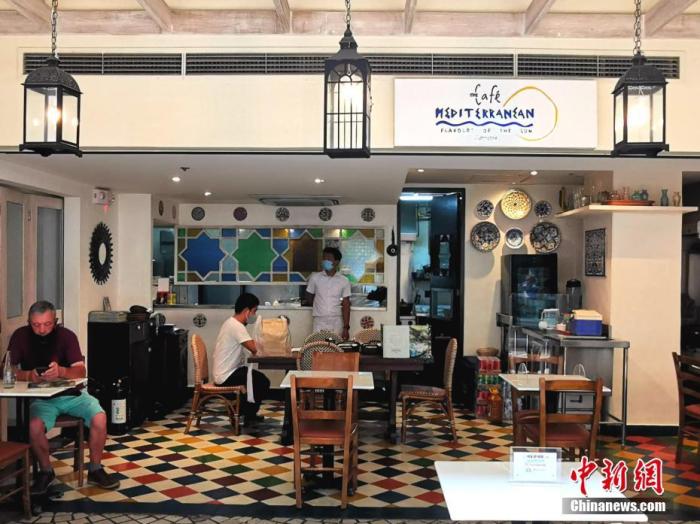China News Service, July 9th, according to statistics from Johns Hopkins University in the United States, as of 7:34 on July 9th, Beijing time, there were more than 11.99 million confirmed cases in the new crown worldwide, and a total of more than 540,000 deaths. The cumulative number of diagnosed cases in the United States has exceeded 3 million, but the White House insists on resuming classes in universities; multi-country cases have set new highs in a single day, calling on the public not to relax their epidemic prevention awareness.
On June 27 local time, the Arizona people in the United States drifted in the river to cool off.
The cumulative number of diagnoses in the United States exceeded 3 million
Trump threatens colleges and universities: no appropriation without resumption
According to statistics from Johns Hopkins University in the United States, at present, the cumulative number of new coronary pneumonia in the United States is 30,461,5, with more than 130,000 deaths.
The cumulative number of confirmed cases in New York State, the most severely affected state in the United States, has approached 400,000. In addition, there are more than 100,000 confirmed cases in 8 states. On the 7th local time, at least 6 states in the United States created a single-day new case record; at least 3 states recorded the highest number of deaths in a single day.
However, President Trump said that the epidemic situation in the United States is "good". He also insisted that colleges resume classes, saying he would put pressure on governors. On the 8th, Trump also said that he would stop providing funding for schools that do not open in the fall, and criticized the CDC's guidelines for school reopenings to be too strict and costly.
US Vice President Pence subsequently said that the CDC will announce the newly formulated epidemic prevention guidelines next week to help schools restart on time. It is reported that the existing guidelines emphasize hygiene measures, the use of masks, and home when appropriate. The guide also recommends staggering schedules, preparing alternate personnel plans, modifying seat layouts to meet social distances, and so on.
On July 7, local time, a large-scale stall in the Makati Green Belt CBD in the Philippines' capital Manila resumed business. Since the Philippines entered the second stage of national anti-epidemic, many industries have gradually resumed production and resumed work. China News Service reporter Guan Xiangdong photo
Multi-national single-day growth rate hits new high
Is it related to the relaxation of public awareness of epidemic prevention?
At present, the epidemic situation continues to spread, and the number of new cases in many countries hits a new high in a single day.
Romania announced on the 8th that 555 new cases were confirmed in the country, a new high since the outbreak, and a total of 30,175 cases were confirmed. Romania’s Minister of Health Tetaru called on the public to be socially responsible, abide by the hygiene rules for epidemic prevention and control, and maintain social distance. Local experts believe that the reasons for the rebound in the Romanian epidemic include many residents relaxing their awareness of prevention and control, gathering violations, and failing to abide by health rules.
There were 2,539 newly confirmed cases on the 8th in the Philippines, which was the highest number of newly confirmed cases in the country on a single day. Recently, there has been a marked increase in cluster infections in the Philippines. More than 300 communities in the capital's Manila region have recently reported cluster infections. The Deputy Minister of Health of the Philippines reminded the public to stay at home as much as possible and not to gather.
On the same day, Indonesia also set a new high in the number of newly diagnosed cases in a single day since the outbreak. The country added 1853 confirmed cases on that day, with a cumulative total of 68079 cases.
Data map: South Korea under the epidemic. China News Agency reporter Zeng Nashe
To curb the spread of the epidemic
Countries strengthen or restart corresponding measures
Since July, South Africa has grown an average of about 10,000 confirmed cases per day, and the cumulative number of confirmed cases has exceeded 210,000, causing concern. In particular, the major informal residential areas, due to dense population and limited living conditions, have become a high-risk area for the spread of the epidemic. The South African government confirmed on the 8th that it will invest 2.4 billion rand in upgrading and reforming informal residential areas, and through measures such as improving water supply and sanitation conditions, it will effectively prevent the spread of the epidemic in densely populated areas.
In Brazil, the epidemic situation in the indigenous regions is still very serious. On the 8th local time, Brazilian President Bossonaro approved the relevant protection measures for the aborigines during the epidemic. The approval bill stipulates that the indigenous communities will be equipped with professional medical teams so that they can be isolated in time before the outbreak enters the community, and measures such as ensuring the supply of new coronavirus testing reagents, drugs and medical equipment.
Recently, there have been frequent mass infections in various parts of South Korea, especially the contagious infections, which are constantly spreading around the church. South Korea’s Central Disaster Security Division said that from 6 p.m. local time, all small-scale gatherings, events, and dinners in churches other than regular services will be completely banned, and the church will be required to introduce electronic registration of identity information by scanning QR codes. Access registration system.
In addition, due to the serious rebound of the epidemic, Uzbekistan decided on August 8 to restart the strengthened isolation control measures from July 10 to August 1, local time; On the 8th, President Tokayev called on the people to strictly abide by the epidemic prevention regulations, saying that this will be a "critical period"; Angola will extend the anti-epidemic measures of the sanitary fences of Kazengo City in Luanda and North Kwanza Province.

